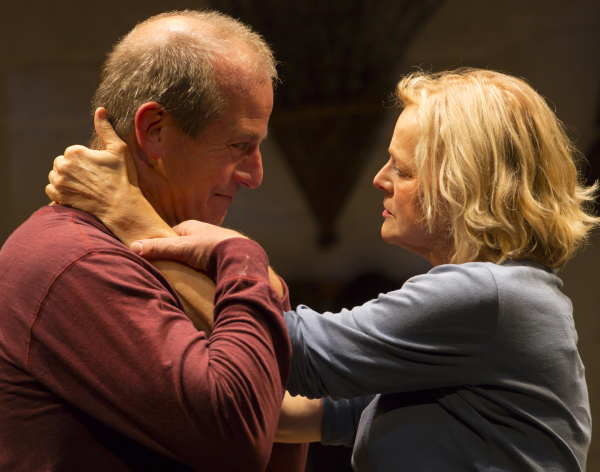Outside Mullingar

(© T. Charles Erickson)
Just as the Irish fog was beginning to clear from the streets of Broadway, the clouds have gathered again at New Brunswick, New Jersey's George Street Playhouse. Fresh from a Tony-nominated Broadway run, John Patrick Shanley's romantic comedy Outside Mullingar has begun its regional rounds within spitting distance of its birthplace. Those who missed out on the production during its world premiere at Manhattan Theatre Club last winter should take advantage of this second chance, if for nothing else than to see Shanley throw his quirky wrench into the formulaic romantic-comedy template, as he did in his Oscar-winning screenplay Moonstruck. Yet under the hand of Artistic Director David Saint, the production is far from a carbon copy of its Broadway predecessor.
John Bolger and Ellen McLaughlin star as Anthony Reilly and Rosemary Muldoon — a pair of surly Irish farmers and lifelong neighbors whose families find themselves in the midst of a land dispute. At the play's opening, a shape-shifting roof (cleverly designed by R. Michael Miller), places us in the Reilly household following the funeral of Rosemary's father, Christopher Muldoon. It is in this most industrious of moments that Anthony's boisterous and bull-headed father Tony (a comedically spot-on David Schramm) chooses to broach the sensitive subject to Christopher's widow Aoife (an equally droll Patricia Conolly). Decades ago, Tony traded Rosemary's father Christopher a small but significant strip of land for 200 pounds, the retrieval of which may now be the key to Anthony's inheritance (or disinheritance). Anticipating his own funeral, Tony needs that last bit of land if he is to sell the farm to a distant relative who he claims has more Reilly blood in him than his own son. Rosemary, however, will have none of this family treason. Though she still holds a grudge against her childhood foe, she'll do whatever it takes to keep Anthony on the other side of the property line where she can continue to gaze at him from afar.
Shanley's dialogue shapes Anthony as a silent martyr, quietly mourning the loss of a preferable life outside his family farm. Yet rather than a bubbling volcano of internal brooding, Bolger is outwardly explosive with his resentment toward life and its unfair circumstances, perpetually shouting at the world for its injustices. Even his quieter, introspective moments are overly demonstrative for a man who lives his life with his cards held tightly to his chest. In spite of this explicit portrayal, Bolger brings a thoroughly satisfying charm to the play's unorthodox romantic climax — though we get the distinct feeling that he's already given us a peek at Anthony's hand before we are ready to see it.
McLaughlin similarly wears her bitterness on her sleeve as the cigarette-smoking, cookware-wielding farm girl Rosemary — though it finds a more apt outlet in the tough-broad character she mines from Shanley's biting text. Even as she pines for the man across the field, there is not a trace of weakness in her desire. Costume designer David Murin even lends her a shapely, feminine wardrobe that she wears with commanding confidence. Quite simply, Rosemary is a woman who gets what she wants and is not ashamed to do whatever it takes to bring it to fruition. She dons a thick layer of emotional Kevlar, but she wears it with such unflappable ease that her moments of vulnerability are that much more jarringly effective, while Shanley's wry wit rings with perfect clarity through her dry delivery.
Schramm and Conolly, as the ancillary characters responsible for most of the play's exposition footwork, take us through their first few scenes with levity and charm, highlighted by Saint's concise direction. However, there's no escaping the sense that Shanley's play is primarily an arduous uphill climb spent waiting for the payoff in its endlessly delightful final scene. Still, while you wish the summit weren't so far away, it makes for a blissful ride coming down.











